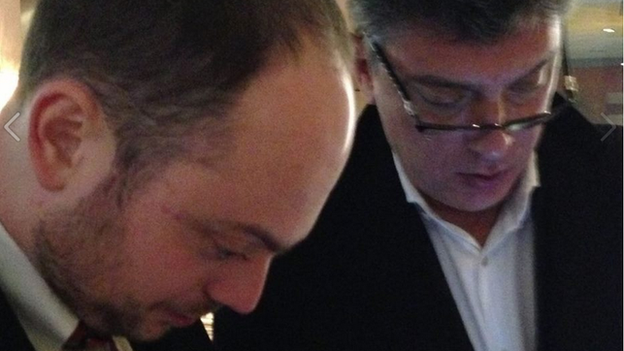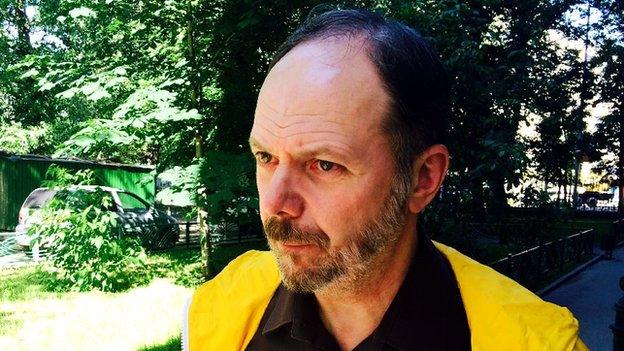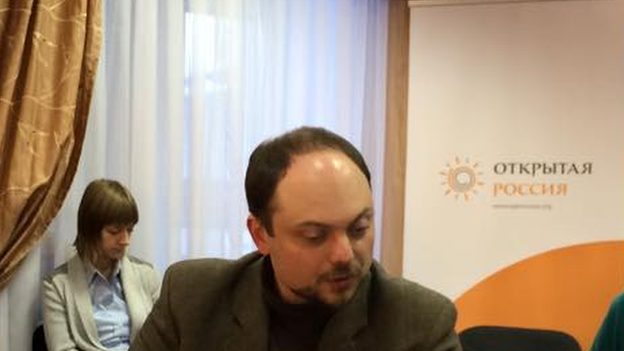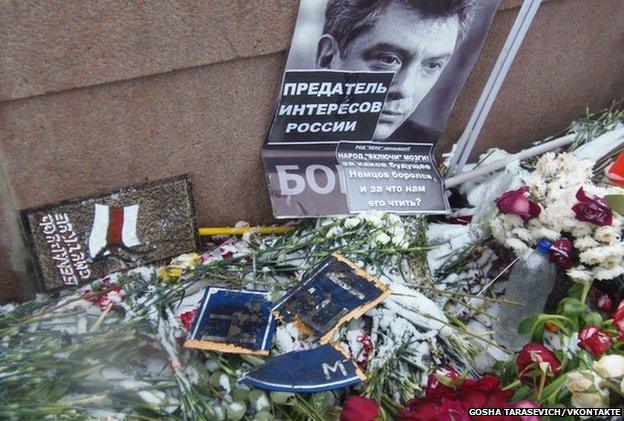Russian activist's sudden illness fuels poisoning suspicion
- Published

Vladimir Kara-Murza (left) was a close friend of murdered politician Boris Nemtsov
The father of a Russian opposition activist has told the BBC he believes the sudden, severe illness of his son is suspicious.
Vladimir Kara-Murza, a dual Russian and British citizen, collapsed in Moscow last Tuesday. The 33-year-old was in a coma for almost a week and has been diagnosed with acute kidney failure.
He has now regained consciousness but still has difficulty communicating; tests to determine what caused his mysterious illness are continuing.
"He was perfectly healthy before, he'd had no chronic illnesses," the activist's father, also Vladimir, says. "It's clear he's been poisoned. But by what or who, we don't know."
Vladimir Kara-Murza was a close friend of Kremlin critic Boris Nemtsov, who was shot dead in Moscow in February.
'Nuclear explosion'
The chief doctor at the Moscow hospital treating Mr Kara-Murza told the BBC that tests revealed traces of an antidepressant.
He speculated that the citalopram, which the activist was taking, may have accumulated in his body if he had a prior, undetected kidney problem.
It may also have reacted with an antihistamine Mr Kara-Murza used for hay fever.

Vladimir Kara-Murza's father: "If someone did want to frighten us, then they succeeded."

Vladimir Kara-Murza works for the Open Russia opposition organisation
His family are sceptical.
"It was just a nasal spray," his father points out, unconvinced that a few drops could have triggered the "nuclear explosion" in his son's kidneys.
Other doctors also say his symptoms are not typical of a citalopram overdose.
"It is not the usual picture, whether an overdose is deliberate or inadvertent," believes Eran Segal. Called in by family friends, the Israeli doctor examined the activist shortly after he was rushed to hospital.
"It could be a severe infection or maybe some other toxin we are not aware of," Dr Segal told the BBC. "But there is no evidence of the cause."
After living abroad for some years, Vladimir Kara-Murza now works for the opposition organisation Open Russia run by oligarch-in-exile Mikhail Khodorkovsky.
His most recent Facebook post is an advert for an Open Russia film alleging serious human rights abuses and corruption in Chechnya.
His father says he was chief "organiser" of the project, but never mentioned receiving any threats.
'One in a million' chance
While the "picture" of symptoms in such a young man is unusual, Dr Segal stresses that it is not necessarily suspicious.

Photos of Boris Nemtsov and tributes to him have been vandalised - one sticker says "traitor to Russia's interests"
But a long history of mysterious deaths linked to Russia is fuelling the family's doubts.
Just last month an inquest in the UK heard that traces of a rare plant poison had been detected in the stomach of Russian businessman Alexander Perepilichny.
A whistleblower in a major tax fraud investigation, his sudden death in 2012 had long been considered suspicious.
So, the Kara-Murza family has sent samples of Vladimir's nails and beard hair to four countries for analysis. Tests so far have not detected toxins.
"Maybe they've thought up some new poison," Mr Kara-Murza told the BBC.
"Or maybe it's a total coincidence: that a politician, an inconvenient one, was poisoned by some cocktail that had gone off," he added.
Though he rated the chances of that as one in a million, he stressed that such a scenario would be ideal.
"That means there's no threat to our family. We can walk the streets. My son doesn't have to leave the country," the father said.
"But if someone did want to frighten us," he said, "then they succeeded."